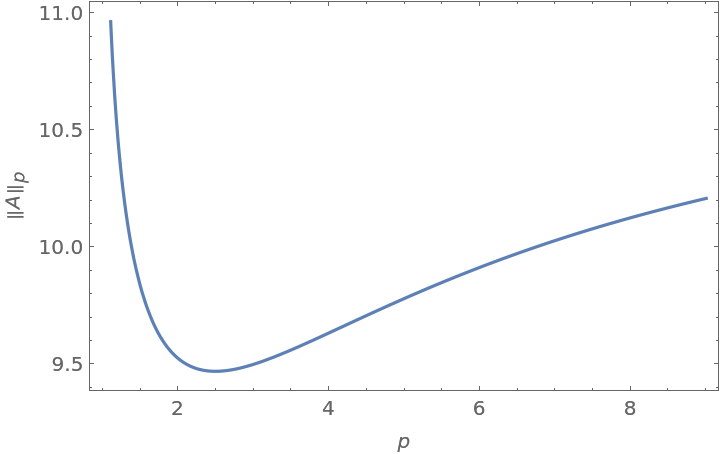Wolfram Function Repository
Instant-use add-on functions for the Wolfram Language
Function Repository Resource:
Estimate the Hölder p-norm of a numerical matrix
ResourceFunction["MatrixNorm"][m,p] gives an estimate of the Hölder p-norm of the numerical matrix m. |
Estimate the 2-norm of a rectangular matrix:
| In[1]:= | ![ResourceFunction["MatrixNorm"][( {
{1, 2},
{3, 4},
{5, 6}
} ), 2]](https://www.wolframcloud.com/obj/resourcesystem/images/a47/a47d9229-2067-443e-9867-184ea50f318d/081c5795f68aed3b.png) |
| Out[1]= |
Compare with the result of Norm:
| In[2]:= | ![Norm[N[( {
{1, 2},
{3, 4},
{5, 6}
} )], 2]](https://www.wolframcloud.com/obj/resourcesystem/images/a47/a47d9229-2067-443e-9867-184ea50f318d/6e2520e558c42ccf.png) |
| Out[2]= |
Estimate the 4-norm of a matrix:
| In[3]:= | ![ResourceFunction["MatrixNorm"][( {
{1, 2},
{3, 4},
{5, 6}
} ), 4]](https://www.wolframcloud.com/obj/resourcesystem/images/a47/a47d9229-2067-443e-9867-184ea50f318d/3f655526930e2112.png) |
| Out[3]= |
Estimate the 4-norm to arbitrary precision:
| In[4]:= | ![ResourceFunction["MatrixNorm"][N[( {
{1, 2},
{3, 4},
{5, 6}
} ), 25], 4]](https://www.wolframcloud.com/obj/resourcesystem/images/a47/a47d9229-2067-443e-9867-184ea50f318d/5fb57d37f23b1d39.png) |
| Out[4]= |
Plot the p-norm of a matrix with varying p:
| In[5]:= | ![Plot[ResourceFunction["MatrixNorm"][( {
{1, 2},
{3, 4},
{5, 6}
} ), p], {p, 1, 9}, {Frame -> True, FrameLabel -> {
Style["p", Italic], "\!\(\*SubscriptBox[RowBox[{\"\[LeftDoubleBracketingBar]\", \"A\", \"\[RightDoubleBracketingBar]\"}], \"p\"]\)"}}]](https://www.wolframcloud.com/obj/resourcesystem/images/a47/a47d9229-2067-443e-9867-184ea50f318d/017c76add3f8d7d4.png) |
| Out[5]= |  |
Increase the "Samples" setting to get a better estimate:
| In[6]:= | ![ResourceFunction["MatrixNorm"][N[({
{2, 1, 4},
{3, 0, -1},
{1, 1, 2}
}), 20], 3]](https://www.wolframcloud.com/obj/resourcesystem/images/a47/a47d9229-2067-443e-9867-184ea50f318d/6e9188df7c625021.png) |
| Out[6]= |
| In[7]:= | ![ResourceFunction["MatrixNorm"][N[({
{2, 1, 4},
{3, 0, -1},
{1, 1, 2}
}), 20], 3, "Samples" -> 21]](https://www.wolframcloud.com/obj/resourcesystem/images/a47/a47d9229-2067-443e-9867-184ea50f318d/2a15e0c7189b0220.png) |
| Out[7]= |
MatrixNorm[m,1] is equivalent to Norm[m,1]:
| In[10]:= | ![{ResourceFunction["MatrixNorm"][N[( {
{1, 2},
{3, 4},
{5, 6}
} )], 1], Norm[N[( {
{1, 2},
{3, 4},
{5, 6}
} )], 1]}](https://www.wolframcloud.com/obj/resourcesystem/images/a47/a47d9229-2067-443e-9867-184ea50f318d/6f3c6357d2926744.png) |
| Out[10]= |
MatrixNorm[m,∞] is equivalent to Norm[m,∞]:
| In[11]:= | ![{ResourceFunction["MatrixNorm"][N[( {
{1, 2},
{3, 4},
{5, 6}
} )], \[Infinity]], Norm[N[( {
{1, 2},
{3, 4},
{5, 6}
} )], \[Infinity]]}](https://www.wolframcloud.com/obj/resourcesystem/images/a47/a47d9229-2067-443e-9867-184ea50f318d/04cab0962d74e490.png) |
| Out[11]= |
For 1<p<∞, MatrixNorm usually gives a good estimate of the p-norm, with less time and effort:
| In[12]:= | ![AbsoluteTiming[NMaxValue[Norm[( {
{1, 2},
{3, 4},
{5, 6}
} ) . x, 4]/Norm[x, 4], x \[Element] FullRegion[2]]]](https://www.wolframcloud.com/obj/resourcesystem/images/a47/a47d9229-2067-443e-9867-184ea50f318d/77da468b39822e43.png) |
| Out[12]= |
| In[13]:= | ![AbsoluteTiming[ResourceFunction["MatrixNorm"][( {
{1, 2},
{3, 4},
{5, 6}
} ), 4]]](https://www.wolframcloud.com/obj/resourcesystem/images/a47/a47d9229-2067-443e-9867-184ea50f318d/324fb09f6ce648ff.png) |
| Out[13]= |
MatrixNorm only works for numerical matrices:
| In[14]:= |
| Out[14]= |
| In[15]:= |
| Out[15]= |
MatrixNorm only estimates p-norms for p>1:
| In[16]:= |
| Out[16]= |
This work is licensed under a Creative Commons Attribution 4.0 International License